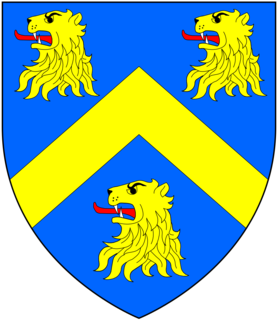Douglas is a common surname of Scottish origin, thought to derive from the Scottish Gaelic dubh glas, meaning "black stream". There are numerous places in Scotland from which the surname is derived. The surname has developed into the given name Douglas. Douglas is a habitational name, which could be derived from any of the many places so-named. While there are numerous places with this name in Scotland, it is thought, in most cases, to refer to Douglas, South Lanarkshire, the location of Douglas Castle, the chief stronghold of the Lords of Douglas. The Scottish Gaelic form of the given name is Dùbhghlas; the Irish language form it is Dúghlas, and Dubhghlas, which are pronounced Irish pronunciation: [duːɣləs]. According to George Fraser Black, in southern Argyllshire the surname is an Anglicised form of the surnames MacLucas, MacLugash.
Thomas, Tommy or Tom Hamilton may refer to:

Earl of Rothes is a title in the Peerage of Scotland. It was created in 1458 for George Leslie, 1st Lord Leslie. He had already been created Lord Leslie in 1445, also in the Peerage of Scotland. His grandson, the third Earl, having only succeeded his elder brother in March 1513, was killed at the Battle of Flodden on 9 September of the same year. His son, the fourth Earl, served as an Extraordinary Lord of Session. Lord Rothes was also tried for the murder of Cardinal Beaton but was acquitted.

Earl of Haddington is a title in the Peerage of Scotland. It was created in 1627 for the noted Scottish lawyer and judge Thomas Hamilton, 1st Earl of Melrose. He was Lord President of the Court of Session from 1616 to 1625. Hamilton had already been created Lord Binning in 1613 and Lord Binning and Byres, in the County of Haddington, and Earl of Melrose, in the County of Roxburgh, in 1619. These titles were also in the Peerage of Scotland. The title of the earldom derived from the fact that he was in possession of much of the lands of the former Melrose Abbey. However, Hamilton was unhappy with this title and wished to replace it with "Haddington". In 1627 he relinquished the earldom of Melrose and was instead created Earl of Haddington, with the precedence of 1619 and with limitation to his heirs male bearing the surname of Hamilton. This derived from the fact that he considered it a greater honour to take his title from a county rather than from an abbey. Hamilton was a member of the prominent Scottish family of that name and descended from John de Hamilton, younger son of Walter de Hamilton, who was granted the feudal barony of Cadzow and who is also the ancestor of the Dukes of Hamilton and Dukes of Abercorn.
Cochrane is a surname with multiple independent origins, two Scottish and one Irish. One of the Scottish names derives from a place in Scotland; the Irish surname and the other Scottish surname are both anglicisations of surnames from the Irish language and Scottish Gaelic respectively.
Charles Hamilton may refer to:
George Hamilton may refer to:
George Baillie-Hamilton-Arden, 11th Earl of Haddington, was a Scottish landowner and representative peer.
This is a list of people who have served as Lord Lieutenant of East Lothian, or Haddingtonshire.
Sir Hamilton can refer to:
George Baillie-Hamilton, 10th Earl of Haddington DL, known as George Baillie until 1858, was a Scottish Conservative politician.
Brigadier-General George Baillie-Hamilton, Lord Binning, CB, MVO, DL was a British Army officer; he was styled "Lord Binning" as a courtesy title.

Admiral William Alexander Baillie-Hamilton was a British naval commander. He served on the Arctic Council when it was searching for Sir John Franklin.
George Baillie-Hamilton, 12th Earl of Haddington, was a Scottish peer from 1917 to 1986.
Charles John Baillie-Hamilton was a British Conservative Party politician.

The Wyndham family are descended from Sir John Wyndham (1443–1503) and his wife Margaret (1443–1524) daughter of John Howard, Duke of Norfolk. Succeeding generations have played an important role in English politics, the law, the military and the arts.

George Baillie was a Scottish politician who sat in the Parliament of Scotland from 1691 to 1707 and in the British House of Commons from 1708 to 1734.
John George Baillie-Hamilton, 13th Earl of Haddington was a British peer and politician of the Conservative Party. He was also a photographer and explorer of the paranormal.
This page is based on this
Wikipedia article Text is available under the
CC BY-SA 4.0 license; additional terms may apply.
Images, videos and audio are available under their respective licenses.





